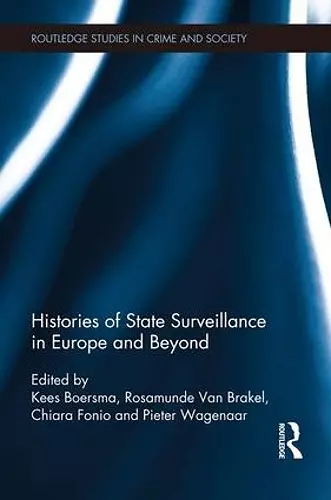Histories of State Surveillance in Europe and Beyond
Rosamunde van Brakel editor Pieter Wagenaar editor Kees Boersma editor Chiara Fonio editor
Format:Paperback
Publisher:Taylor & Francis Ltd
Published:3rd Mar '16
Currently unavailable, and unfortunately no date known when it will be back
This paperback is available in another edition too:
- Hardback£155.00(9780415829465)

Does the development of new technology cause an increase in the level of surveillance used by central government? Is the growth in surveillance merely a reaction to terrorism, or a solution to crime control? Are there more structural roots for the increase in surveillance?
This book attempts to find some answers to these questions by examining how governments have increased their use of surveillance technology. Focusing on a range of countries in Europe and beyond, this book demonstrates how government penetration into private citizens' lives was developing years before the ‘war on terrorism.’ It also aims to answer the question of whether central government actually has penetrated ever deeper into the lives of private citizens in various countries inside and outside of Europe, and whether citizens are protected against it, or have fought back.
The main focus of the volume is on how surveillance has shaped the relationship between the citizen and the State. The contributors and editors of the volume look into the question of how central government came to intrude on citizens’ private lives from two perspectives: identification card systems and surveillance in post-authoritarian societies. Their aim is to present the heterogeneity of the European historical surveillance past in the hope that this might shed light on current trends.
Essential reading for criminologists, sociologists and political scientists alike, this book provides some much-needed historical context on a highly topical issue.
‘Histories of State Surveillance is carefully curated, essential reading for anyone interested in the history and practice of surveillance in comparative perspective. Against a robust theoretical discussion by David Lyon and Edward Higgs, this volume showcases the work of some of the most exciting new surveillance scholars writing today.’ - Kirstie Ball, Professor of Organization, The Open University, UK
‘This book places an important marker in the sand, by alerting us to the significance of history. History is important to surveillance studies because institutions, actors and activities in the past shape attitudes and behaviours in the present, and those of the present shape the future. As this book demonstrates, "the state" is a surveillance intensive environment, which differs from one national and institutional context to another – and by recognizing these differences we can start to appreciate the ubiquitous but differentiated and nuanced nature of surveillance. In doing so, this book provides an essential exploration of the intertwined relations between history, the state and surveillance.’ - Professor William Webster, University of Stirling, UK
ISBN: 9781138665866
Dimensions: unknown
Weight: 340g
280 pages